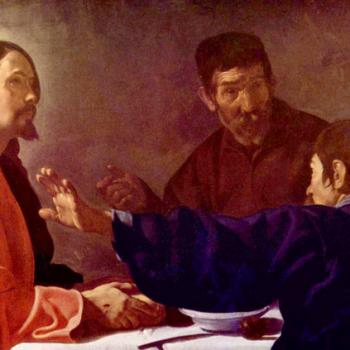That Awkward Moment
One of the most awkward moments I ever squirmed through in church was set in motion by a somewhat over-zealous plea for Vacation Bible School volunteers. I learned later that it all began with the person who wanted to give the announcement waving wildly in the back to get the pastor’s attention.
And this pastor really didn’t like announcements.
As the VBS leader gave her impassioned plea, she ended with this: “We need you. The kids need you. God needs you.”
This pastor was also highly allergic to manipulative sales pitches. And he was a strong Calvinist. Enter the moment of awkwardness, a.k.a., the proverbial red pen.
As the woman retreated from the stage area the pastor stepped to the mic and said something along these lines: “Well, God doesn’t need you, the kids might need you, and we do all need you to do whatever it is God has gifted you.”
Does God Need Us?
The idea that God needs us sounds rather arrogant. After all, this is the God who says, “If I were hungry, I wouldn’t tell you.” That’s not how it works. God doesn’t need us, we need God: “Call on me in the day of trouble; I will deliver you, and you shall glorify me” (Psalm 50:12, 15).
So if we are going to think our way through the power and possibilities that God has at God’s disposal, we can easily conclude that God can do everything on God’s own. God doesn’t need us.
But then there’s the actual story.
The story of how God has chosen to be at work in the world.
The story of God choosing people. Then choosing a people.
The actual story we see unfolding around us and the biblical story that inspires our own imaginations about who God is and what it looks like for God to be at work in the world shows us that what we do matters. What we do shapes how God is and isn’t, can and can’t be, at work in the world.
Karl Barth might say that this is all an expression of God’s freedom. Roger Olson calls it God’s self-limitation.
It’s the limitation that happens when God chooses a law-abiding people as the means by which God’s name will be known on the earth. It’s the limitation that happens when God chooses preachers to make known the reality that redemption has been accomplished. It’s the limitation that happens when God chooses to gift people by the Spirit to see to it that God’s work on earth is done.
And it’s even the limitation that happens when God chooses to rescue the world through the Human One.
Jesus: the Us God Needed
When we read the Gospel stories we are often so conditioned by knowing the outcome that the dramatic tension passes us completely by.

But in the Garden of Gethsemane, the quest stood on the edge of a knife.
It was a moment of intense anguish for Jesus. And it was a moment when, as Matthew tells it, Jesus had to be the faithful human or else God’s plan would completely fall apart.
After one of the disciples lops off the ear of the high priest’s slave Jesus says,
“Do you think that I cannot appeal to my Father, and he will at once send me more than twelve legions of angels? But how then would the scriptures be fulfilled, which say it must happen in this way?” (Matt. 26:53-54, NRSV)
There’s a possibility hanging in the air. It is the possibility of a divine rescue that would thwart the divine plan. The only way for scripture to be fulfilled is for Jesus to embrace the fate assigned to the human one, for Jesus to be faithful to the point of death, even death on the cross.
Us: the Us God Still Needs
The Jesus story simultaneously shows us two things: the God who is for us, and the us that is for God.
The God who is for us has given us a calling, a life, a job to do in God’s name to bring God’s purposes to completion.
The us who is for God is a people who will faithfully walk in this way even to the point of death.
The world we actually live in is the one whose script we see Jesus playing: it is a world where God has chosen to bind Godself to the faithful workings of God’s people. The Father’s plan needed the faithful son who would go to the cross. The ongoing plan requires a people who are worthy enough disciples that they take up their crosses and follow.
The Story-Bound God
This blog is called “Storied Theology: Telling the Story of the Story-Bound God.” Some people don’t like that “story-bound God” thing very much. Too limiting. Too controlling. Too much of a box.
But here’s my root conviction: the story that unfolds across the Old and New Testaments shows us what God is like. It’s a conglomeration of storylines in which God makes promises that have to be kept. And it is also the place where we read that God keeps those promises in surprising ways.
Because God is faithful, God cannot do just anything. But because God is God, we are still constantly surprised.
God has chosen to need us. It’s the pinnacle of human dignity, and it is God’s gift to us. God has not given up on the place of humanity as God’s family and as God’s image-bearers: those who show the cosmos what the true and living God is like.
That’s the story I’m in.
Are you in?












